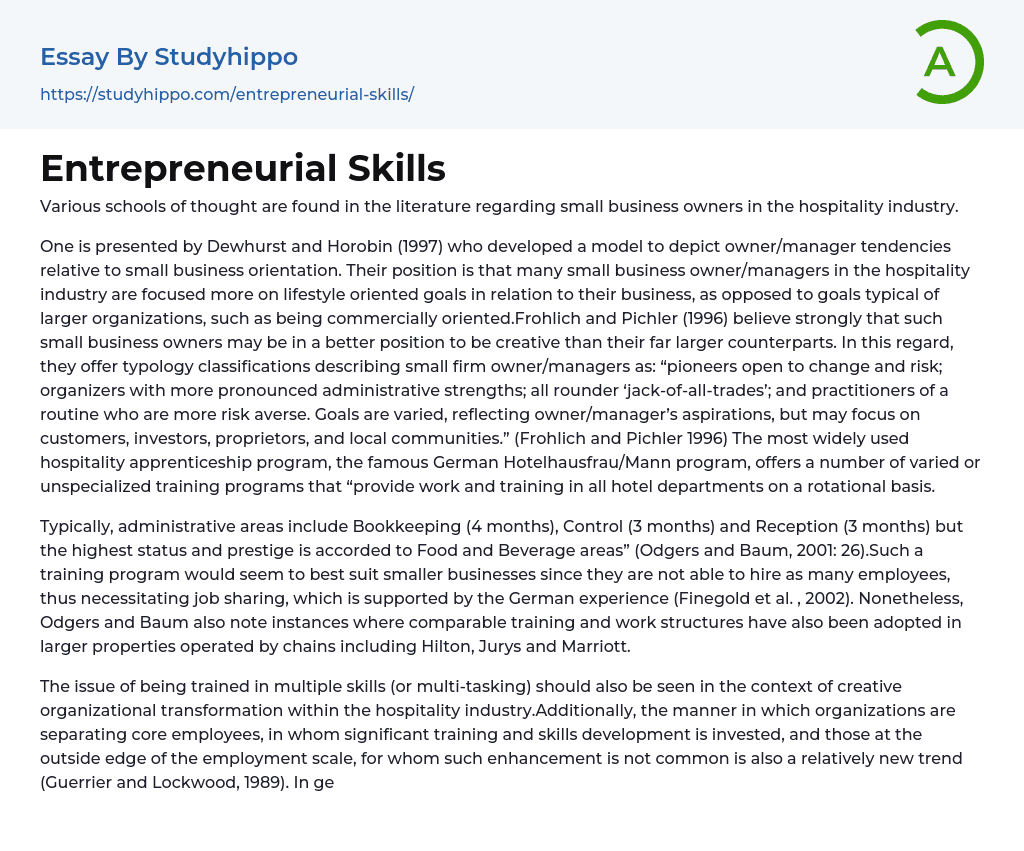Within the literature, diverse perspectives exist surrounding small business proprietors operating within the hospitality sector.
Dewhurst and Horobin (1997) developed a model to show the tendencies of small business owners and managers regarding small business orientation. According to their model, many small business owner/managers in the hospitality industry focus on lifestyle-oriented goals rather than goals typical of larger organizations, such as being commercially oriented. Frohlich and Pichler (1996) believe that small business owners may be more creative than their larger counterparts. They offer typology classifications for small firm owner/managers such as pioneers, organizers, all-rounders, and routine practitioners. These classifications reflect the varied goals of owner/managers, which can focus on customers, investors, proprietors, and local communities.
The German Hotelhausfrau/Mann program is the most commonly used hospitality apprenticeship program. It offe
...rs unspecialized training programs that provide work and training in all hotel departments on a rotational basis.
According to Odgers and Baum (2001: 26), administrative areas typically consist of Bookkeeping (4 months), Control (3 months) and Reception (3 months), with Food and Beverage being the most esteemed. For smaller businesses that cannot afford more staff, job sharing is a viable option, as evidenced by the German approach (Finegold et al., 2002). However, larger properties under Hilton, Jurys, and Marriott chains have also implemented similar training and work structures, as mentioned by Odgers and Baum.
The concept of multi-tasking or being trained in multiple skills should be considered within the context of the hospitality industry's creative organizational transformation. A new trend is emerging where core employees receive significant training and skills development, while those on the outside edge of the employment scale do not benefit from such enhancement (Guerrier
and Lockwood, 1989). Developing skills across a range of functional areas may increase the likelihood of acceptance within the organization for each employee, even though there is limited evidence supporting this idea. Encouraging employees to acquire additional skills aligns with a creative approach to empower the workforce.
Employers are recognizing the benefits of employee involvement and relations, which can be achieved through offering autonomy, creativity, cooperation, and self-control in work processes. The use of mechanisms that provide education and increased participation, such as team briefings and quality circles, support a creative or empowered working environment. In the hospitality industry, good practices also include holding accreditation such as Investors in People (IiP), Excellence Through People (ETP), Hospitality Assured, and ISO 9000. These initiatives are closely related to creativity, which is important for employee skills according to researchers such as Tomkins (2004) who investigated this topic in regards to local employers and recent graduates of the University of Gloucestershire in England.
The objective of this research was to devise effective techniques that assist students in developing key skills through the use of personal development planning (PDP). According to the study's findings, employers demand self-assured, autonomous thinkers who can effectively communicate with a wide range of stakeholders in various settings (Tomkins, 2004:12), implying the importance of creativity. The research also revealed that fresh graduates frequently experience a lack of confidence in their initial jobs. Tomkins suggested that work experience (comprising community or live project work), hands-on modules, and personal development planning play crucial roles in supporting the skill development most commonly required by students. Supporting this idea, Bill and Bowen-Jones (2004) strongly advocated an integrated approach to training potential hospitality
personnel—employing PDP alongside the academic curriculum and additional learning prospects—in order to fortify students' development of entrepreneurial skills and creativity, which are essential for navigating a highly competitive, complex, and dynamic workplace (Tomkins, 2004:18).
- Academia essays
- Higher Education essays
- Language Learning essays
- Studying Business essays
- Education System essays
- Study essays
- First Day of School essays
- Scholarship essays
- Pedagogy essays
- Curriculum essays
- Coursework essays
- Studying Abroad essays
- Philosophy of Education essays
- Purpose of Education essays
- Brainstorming essays
- Educational Goals essays
- Importance Of College Education essays
- Brown V Board of Education essays
- The Importance Of Higher Education essays
- Online Education Vs Traditional Education essays
- Academic And Career Goals essays
- Academic Integrity essays
- Brown Vs Board Of Education essays
- Distance learning essays
- Technology in Education essays
- Vocabulary essays
- Writing Experience essays
- Importance of Education essays
- Early Childhood Education essays
- Academic Degree essays
- Academic Dishonesty essays
- School Uniform essays
- Academic writing essays
- Cheating essays
- Bachelor's Degree essays
- MBA essays
- College Life essays
- Grade essays
- Diploma essays
- Phonology essays
- Sentence essays
- Filipino Language essays
- Pragmatics essays
- Millennium Development Goals essays
- History Of Education essays
- Graduate School essays
- Middle School essays
- School essays
- Special Education essays
- University essays




